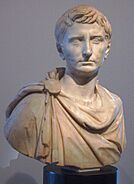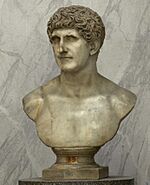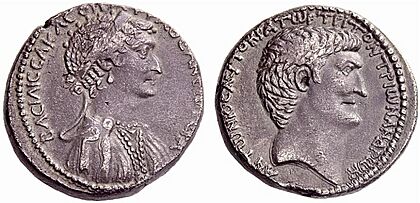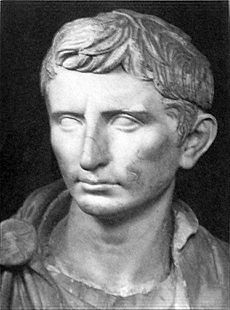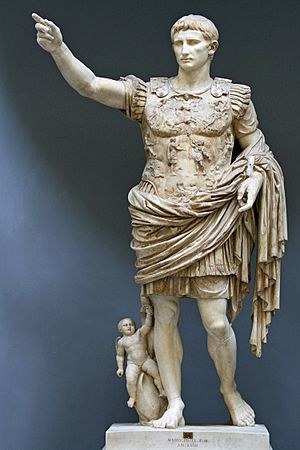War of Actium facts for kids
Quick facts for kids War of Actium |
|||||||||
|---|---|---|---|---|---|---|---|---|---|
| Part of the Crisis of the Roman Republic | |||||||||
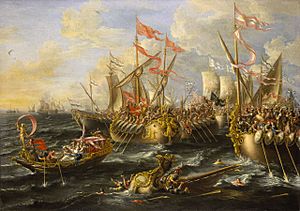 Anachronistic baroque painting of the Battle of Actium by Laureys a Castro, 1672 |
|||||||||
|
|||||||||
| Belligerents | |||||||||
| Western Roman provinces | Eastern Roman provinces Ptolemaic Egypt |
||||||||
| Commanders and leaders | |||||||||
|
|
||||||||
| Strength | |||||||||
| 200,000 Roman legionaries 450 Roman warships and transports |
173,700 Roman legionaries 18,000 Ptolemaic soldiers 5,000 Median reinforcements 154 Roman and Ptolemaic warships and transports |
||||||||
| Casualties and losses | |||||||||
| 50,000 | 75,000 | ||||||||
The War of Actium (32–30 BC) was the very last civil war of the Roman Republic. It was a big fight between Mark Antony (who had help from Cleopatra and Egypt) and Octavian. In 32 BC, Octavian convinced the Roman Senate to declare war on Queen Cleopatra of Egypt. Her partner and friend, Mark Antony, who was also Octavian's rival, decided to support her.
A large part of the Roman Senate, including both top leaders called consuls, left Rome to join Antony. Octavian won a major victory at the Battle of Actium. After this, Cleopatra and Antony went back to Alexandria. Octavian then surrounded the city. Antony and Cleopatra were forced to take their own lives.
This war involved some of the biggest Roman armies ever seen. Both Antony's and Octavian's legions were made up of experienced soldiers. Many of them had fought together in earlier civil wars. Some had even served under Julius Caesar.
After the war, Octavian brought peace to Rome. The country had been troubled by a hundred years of civil wars. This peace started the Pax Romana, a time of calm and stability. Octavian became the most powerful person in the Roman world. In 27 BC, the Senate gave him the special title of Augustus. Octavian, now called Augustus, became the first Roman emperor. He changed the Roman Republic into the Roman Empire.
Contents
The War of Actium: A Big Roman Showdown
Why Did the War Start?
Mark Antony was in Egypt with Cleopatra instead of his wife, Octavia. Octavia was Octavian's sister. Octavian wanted to find a way to break ties with Antony. He planned to start a war to defeat him and take control of the entire Roman world. He did this by showing Antony's will to the Senate. In the will, Antony said he would leave all his money to his children with Cleopatra. He also planned for them to rule kingdoms. Romans were shocked by this. Then Antony divorced Octavia to marry Cleopatra.
Octavian used a campaign to convince the Senate to declare war on Cleopatra. They didn't want to declare war on Antony because he was a Roman. Octavian didn't want a rebellion. Eventually, Octavian made Antony's supporters in the Senate leave Rome. In 32 BC, the Roman Senate declared war against Cleopatra.
Getting Ready for Battle
Who Was in Charge?
After Julius Caesar was killed, Octavian, Antony, and Marcus Lepidus formed the Second Triumvirate. They stepped in to fill the power vacuum. After they defeated their enemies at the Battle of Philippi in 42 BC, and Lepidus left the group in 36 BC, Octavian and Antony were the two most powerful men. Octavian controlled the western parts of Rome, like Hispania, Gaul, Italia, and Africa. Antony controlled the eastern parts, like Greece, Asia, Syria, and Egypt.
For a while, Rome had peace. Octavian stopped rebellions in the west. Antony reorganized the east. But the peace didn't last long. Antony was in a relationship with Cleopatra, the queen of Egypt. Romans, especially Octavian, noticed this. Since 40 BC, Antony had been married to Octavia Minor, Octavian's sister. Octavian used this chance. He had his helper Gaius Maecenas start a campaign against Antony.
Most Romans were surprised when they heard about Antony's Donations of Alexandria. In these donations, Antony gave much of Rome's eastern land to Cleopatra. Cleopatra and Caesarion were made co-rulers of Egypt and Cyprus. Antony's other children with Cleopatra were also given kingdoms to rule. Cleopatra took the title "queen of kings."
Octavian attacked Antony more and more. But the Senate and people of Rome were not fully convinced. Octavian's chance came when Antony married Cleopatra in 32 BC, before divorcing Octavia. This, plus news that Antony planned to create a second Senate in Alexandria, gave Octavian a reason to take away Antony's power.
Octavian called the Senate together. He accused Antony of being against Rome. Octavian had illegally taken Antony's will from the Temple of Vesta. In it, Antony said Caesarion was Caesar's true son. He left his things to his children with Cleopatra. He also wanted to be buried with Cleopatra in Alexandria, not Rome. The senators were not bothered by his children, but his wish to be buried outside Rome made them furious. Octavian blamed Cleopatra, not Antony. The Senate declared war on Cleopatra. Octavian knew Antony would help her.
When Cleopatra heard Rome had declared war, Antony supported Egypt. The Senate immediately took away all of Antony's power. They called him an outlaw and a traitor. However, 40% of the Senate, and both consuls, sided with Antony. They left Rome for Greece. Octavian gathered all his legions, almost 200,000 Roman soldiers. Cleopatra and Antony gathered about the same number of Roman and Egyptian soldiers.
The War Begins: Sea Battles
By mid-31 BC, Antony moved his army into Greece, and Octavian followed. Octavian brought his main military advisor and friend, Marcus Vipsanius Agrippa, to lead his navy. Octavian's fleet had more ships, even though the land armies were similar in size. Antony's fleet had large ships, but their crews and commanders were not very experienced. Octavian's fleet had smaller, faster ships with skilled sailors.
Octavian moved his soldiers across the Adriatic Sea to face Antony near Actium. Meanwhile, Agrippa used the navy to stop Antony's supplies. There were some smaller fights. Octavian decided not to attack directly to avoid losing soldiers. Instead, he wanted to fight Antony at sea, where his experienced sailors could win. Both sides waited for the right moment. As summer ended, both Octavian and Antony prepared for a long fight. Waiting helped Octavian. Antony's supporters started to leave him, but his soldiers remained loyal.
The first major fight happened when Octavian's general Agrippa captured the Greek city of Methone. This city had been loyal to Antony. Agrippa's quick attacks were successful. On land, Antony's experienced cavalry won most of the smaller fights. Antony was a good soldier, but he didn't understand naval warfare. This led to his defeat. Antony moved his fleet to Actium, where Octavian's navy and army were camped.
The stage was set for one of the biggest naval battles ever. Antony had 290 warships and 30 to 50 transport ships. Octavian had 350 ships. Antony's ships were much larger and had more weapons. On September 2, 31 BC, Antony moved his large ships, called quinqueremes, into the open sea. There, Octavian's light and fast Liburnian ships formed a battle line against Antony's warships. Cleopatra stayed behind Antony's line on her royal boat.
A big problem for Antony happened when one of his former generals gave Antony's battle plan to Octavian. Antony had hoped to use his biggest ships to push back Agrippa's side of the line. But Octavian's entire fleet stayed out of reach. After midday, Antony had to move his ships away from the shore's protection and finally attack. Octavian's fleet, with better trained and fresher crews, quickly defeated Antony's larger, less experienced navy. Octavian's soldiers had fought in Roman naval battles for years. They would ram enemy ships and shoot arrows and stones at the crew on deck.
As the armies watched the naval battle, they saw Antony being defeated by Agrippa. Seeing the battle going badly, Cleopatra decided to follow Antony's original orders. She took her ships and tried to break through Octavian's center. As a gap opened, she sailed through. Antony then ordered his whole fleet to break through Octavian's lines. Antony led the charge and managed to get through Octavian's center. However, right after Antony broke through, Agrippa ordered his sides to attack the rest of Antony's ships from both directions. Antony and Cleopatra could only watch as their fleet was destroyed.
The couple had to take their remaining 90 ships and escape to Alexandria. When Antony's soldiers on land saw his fleet destroyed, they tried to meet up with him. But without control of the sea, supplies for Antony's soldiers ran out. After a week, the commanders of Antony's land forces surrendered without a fight. By the end of the day, Antony's entire fleet was at the bottom of the sea. It was the biggest naval battle Rome had seen in almost 200 years.
The Land Campaign and Final Days
Even though Octavian wanted to chase Antony and Cleopatra right away, many of his experienced soldiers wanted to retire. Octavian allowed many of his longest-serving soldiers to leave. Some of these soldiers had served since Julius Caesar's time, about 20 years earlier.
Chasing Antony and Cleopatra
After winter, Octavian continued the hunt. In early 30 BC, Octavian decided not to sail his army across the sea to attack Alexandria directly. Instead, he traveled by land through Asia. Antony had received much support from Rome's smaller kingdoms in the east. By marching his army by land, Octavian made sure Antony couldn't gather new forces.
Most of Antony's army, 23 legions plus 15,000 cavalry, had been left in Greece after Actium. Without supplies, they eventually surrendered. Meanwhile, Antony tried to get an army from Cyrenaica from Lucius Pinarius. But Pinarius had switched his loyalty to Octavian. When Octavian heard this, he told Pinarius to move his four legions east towards Alexandria. Octavian would move west. Trapped in Egypt with what was left of their army, Antony and Cleopatra waited for Octavian to arrive.
When Octavian and Pinarius reached Alexandria, they surrounded the entire city. Before Octavian arrived, Antony took his remaining 30,000 soldiers and attacked Pinarius. Antony didn't know he was outnumbered two to one. Pinarius destroyed what was left of Antony's army. Antony escaped back to Alexandria before Octavian arrived. As Octavian approached with his soldiers, what was left of Antony's cavalry and fleet surrendered to him. Most of Antony's remaining foot soldiers surrendered without fighting. Antony's cause was lost.
The End for Antony and Cleopatra
Antony was forced to watch as his army and his hopes of ruling Rome were given to Octavian. Following Roman tradition, Antony took his own life on August 1, 30 BC. Ancient stories say he was not entirely successful and, with a wound, was taken to Cleopatra. She had gone to her mausoleum. Antony died in her arms, leaving her alone to face Octavian.
Cleopatra did not die right away. Instead, she tried to negotiate with Octavian. Cleopatra begged Octavian to spare Caesarion's life if she agreed to be imprisoned. Octavian refused. Within a week, Octavian told Cleopatra she would be part of his victory parade back in Rome. This role was "carefully explained to her." Caesarion was "killed without mercy." Octavian supposedly said "two Caesars are one too many" when he ordered Caesarion's death. According to Strabo, who lived at that time, Cleopatra died from a bite from a poisonous snake, or by putting a poisonous ointment on herself.
When Octavian learned of Cleopatra's death, he had mixed feelings. He admired her bravery. He gave her and Antony a public military funeral in Rome. The funeral was grand, and some of Antony's legions marched with the tomb. A day of mourning was held throughout Rome. This showed Octavian's respect for Antony and also helped show the Roman people how kind Octavian was. As they left Alexandria, a new age began when Rome took over Egypt. With Cleopatra's death, the last war of the republic was over.
What Happened After the War?
Within a month, Octavian was named pharaoh, and Egypt became his personal property. By punishing Antony's supporters, Octavian finally ended a century of civil war. In 27 BC, the Senate named Octavian Augustus and gave him great power. Octavian, now Augustus, changed the republic into the Roman Empire. He ruled as the first Roman emperor.
Octavian Becomes Emperor Augustus
In the months and years that followed, Augustus passed many laws. These laws made it seem like the republic was still in charge. But they actually gave him the most power and authority. He created the base for what is now called the Roman Empire. From then on, Rome would be ruled by a princeps (first citizen). In modern terms, Rome would be ruled by emperors.
The Senate still seemed to have power over some provinces. But the important border provinces, like Syria, Egypt, and Gaul, which needed the most soldiers, would be directly ruled by Augustus and the emperors after him.
The Roman Peace Begins
With the end of the last civil war, the republic was replaced by the empire. Augustus's rule would bring in a golden age of Roman culture. It would also bring a stability that Rome had not seen in over a hundred years. With Rome controlling the entire Mediterranean world, peace would last for centuries after Augustus's death. This time was called the Pax Romana (Roman Peace).
Three Roman emperors in the 1st century, Caligula, Claudius, and Nero, were direct relatives of Antony.
The empire that Augustus started would last in Western Europe until the fall of Rome in the 5th century AD. The eastern part of the Roman Empire, known as the Byzantine Empire, would survive until the fall of Constantinople in AD 1453.
See also
- Legionary denarii (Mark Antony)
- List of Roman civil wars and revolts
 | Frances Mary Albrier |
 | Whitney Young |
 | Muhammad Ali |


